Here Comes the Rain Again: Team MoA-INFO springs into action
- September 30, 2020
- 8 minutes read
As Kenya’s Short Rains agricultural season commences Maureen Kuboka, Wanjiku Macharia, Daniel Mokrauer-Madden, Sidney Muchule, JingKai Ong, Yifan Powers and Stefania Pozzi walk us through what MoA-INFO has in store.
A majority of Kenya’s arable land is cultivated in line with two seasons, the Long Rains – which runs from February-March to June-August – and the Short Rains – which runs from September-November to December-January.
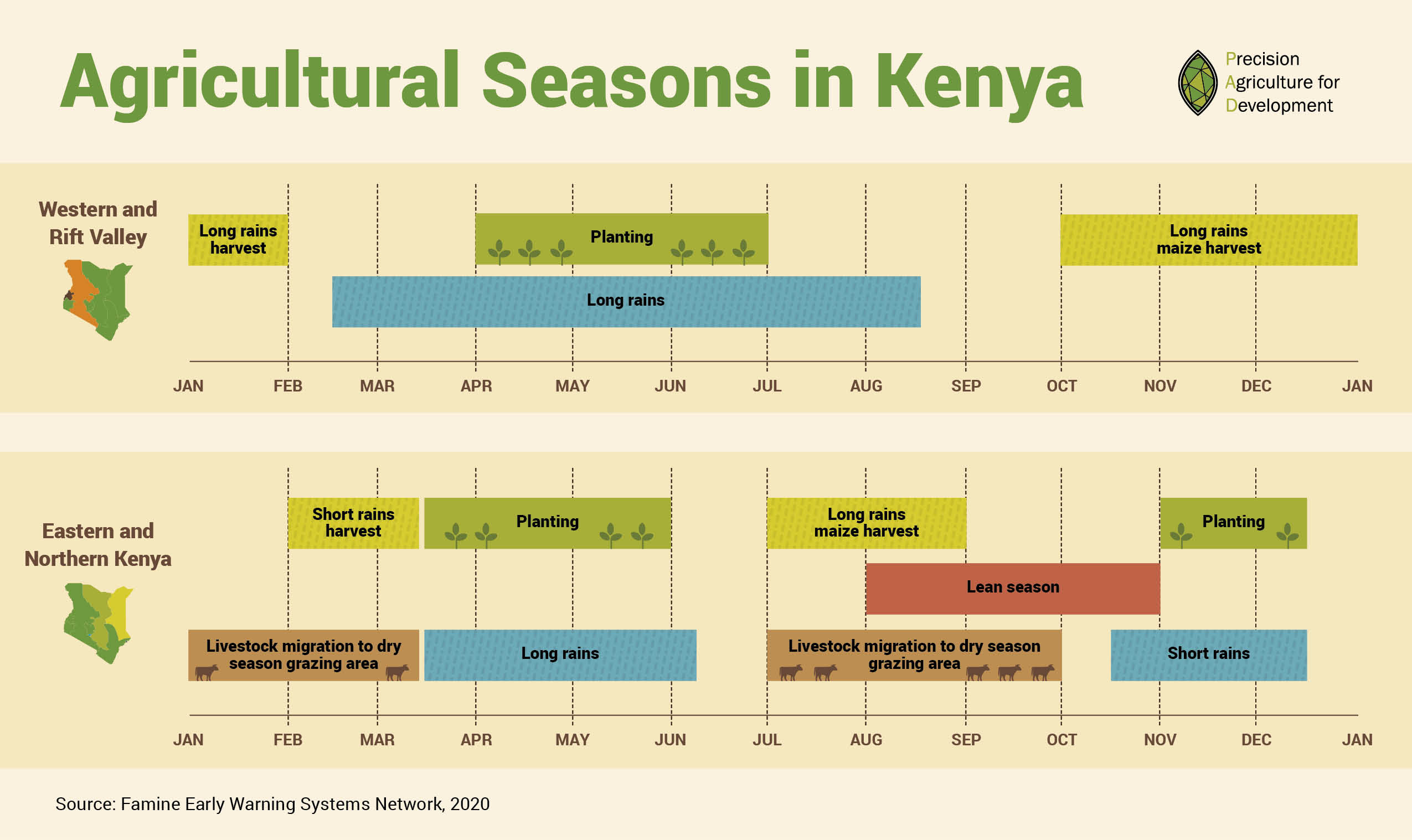
This year will mark the fifth growing season in which MoA-INFO is used to offer digital cropping advice to Kenyan farmers. We now provide advice on ten crops: maize, beans, Irish potatoes , sweet potatoes , pigeon pea, bananas , tomatoes , sorghum, onion , and green gram (mung bean).
As the 2020 Short Rains season gets underway (we commenced sending messages in August to cover pre-planting topics in areas of the country where the rains start earlier), our whole team has been busy working on every aspect of the platform. Here are some updates from some members of the team about what we have been working on:
Maureen Kuboka, Agronomy Associate
Decision support tools enable farmers to access information on optimal input use in an effort to assist them make more informed decisions. Our seed tool allows farmers to learn about maize and bean varieties that are best suited to their agro-ecological zones. In the 2020 Long Rains season, approximately 17,000 farmers accessed the maize seed tool. We identified that many farmers would benefit from information on certified bean seeds which are available in the market. Advisory content on beans was integrated into the seed tool ahead of the Short Rains season.
In preparation for next year’s Long Rains season, the agronomy team has started to compile seed lists for certified maize and beans varieties that will be available for planting in that season. To ensure that the information we offer is relevant and comprehensive we work with the Kenya Plant Health Inspectorate Service (KEPHIS) and agricultural seed companies to source information. We are particularly keen to distribute information on more recently released seeds.
Stefania Pozzi, Global Senior Research Associate
Once agronomic recommendations on a specific topic are finalized, we can start programming on Paddy, our in-house messaging platform. Paddy is built as a set of applications in a programming language called Erlang. When new agronomic content is programmed, we add different applications aligned with whether the information will be accessed as push content (sent to farmers) or pull content (accessed by farmers by navigating an interface). While the advice remains constant, we vary our end messages in an effort to promote user engagement.
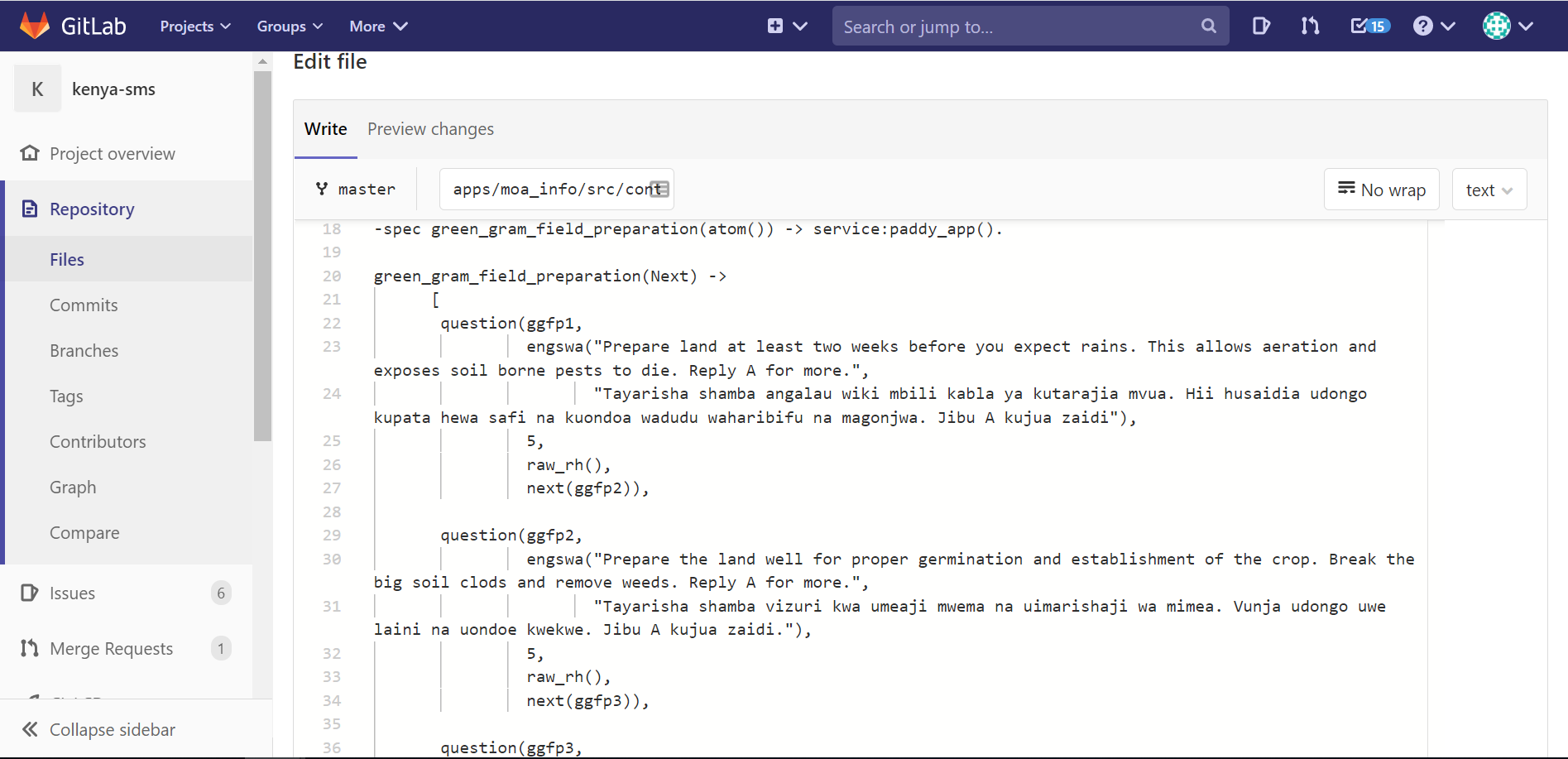
A screen grab from GitLab
We use Gitlab for version control. Each developer starts his/her own Gitlab project branch when modifying or adding Paddy modules, and this branch is only merged in the master branch after modifications have been reviewed and approved by other developers who have been assigned as reviewers. Before sending a merge request, we test all changes with a simulator I run on my Linux machine. We can simulate the interactions between Paddy and MoA-INFO users with a bi-directional interactive communication with a virtual terminal connection. If everything works as expected, changes are ready to be pushed to the remote Paddy repository and a merge request can be formulated.
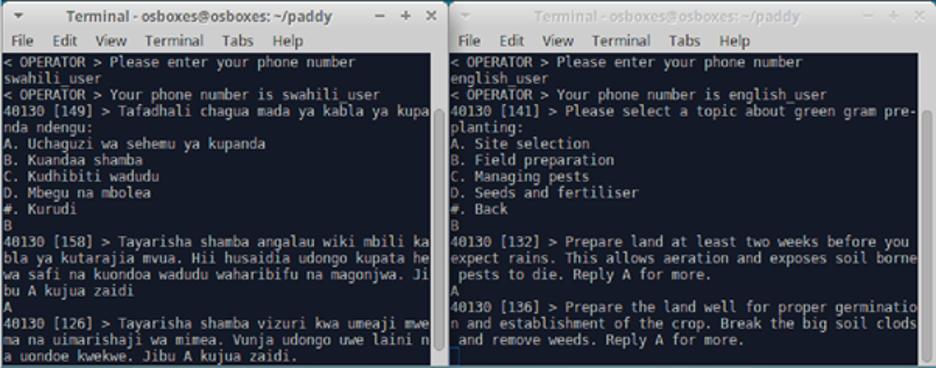
Putting Paddy through its paces on Linux
Wanjiku Macharia, Software Developer
I have designed a scheduler to send invitation messages to users using the MoA-INFO platform. The scheduler is designed so that the information farmers receive is optimized to their activities at that point in the season.
We now have over 150 topics on the Paddy platform, so it is important to make sure that each user receives the most important information at the right time. In order to ensure that our information is relevant and timely, we consider each user’s crop choice, the cropping calendar from our agronomists, and the information we have on the user’s planting dates (some users provide us the exact date; when we do not have that information, we use averages for their area), and associate this information with their unique phone number.
The scheduler is updated each week to ensure that users who have changed their crop choices, who have updated their planting dates, or who have opted out of a cropping series have these preferences and additional information accounted for. Sends from the scheduler are made automatically on Tuesdays and Fridays at a time of day when users are most likely to be responsive.
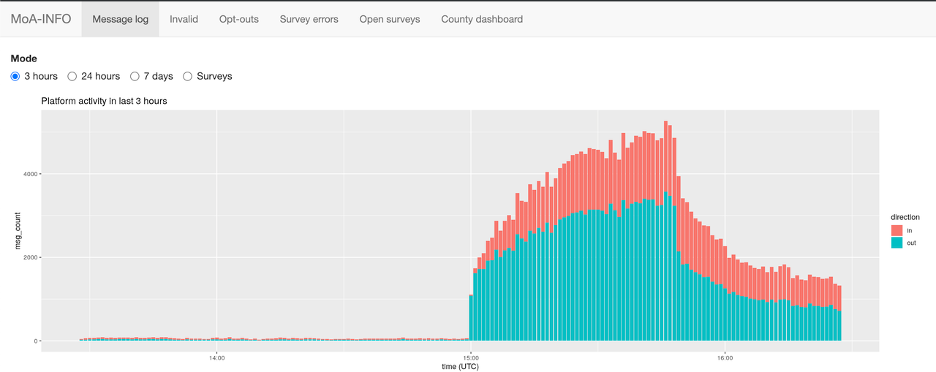
A Tsunami of decision support
The screengrab above captures the scheduler as it pushes content to – and services follow up messages from – Kenyan farmers. Over the first 45 minutes, 67,500 invitation messages are pushed to farmers (blue bars). Incoming messages are captured (red bars) as farmers reply and engage with the content.
Sidney Muchule, Research Associate
For the short rains season of 2020, I am conducting a number of A/B tests to increase our understanding of engagement on the platform. In an effort to provide more – and more relevant – information to our users, we have gradually increased crop offerings. While it is easy to assume that this will have a positive effect on levels of engagement, it is important to better understand the value of such efforts.
To achieve this, we will conduct A/B tests that center around common behavioral science concepts such as choice set design (decision-making based on how options are presented), time inconsistency (hyperbolic discounting and procrastination) and prospect theory. I will also look at how some demographic characteristics we have collected may influence interaction on the platform.
JingKai Ong, Global Research Associate
MoA-INFO’s platform engagement data is housed in a PostgreSQL database which can be accessed securely through a PG Admin site. The database can be queried in order to monitor engagement, check for bugs, and generate up-to-date lists of farmers for the purpose of sending new messages.
As part of ongoing efforts to improve the seed selector tool, the PAD Kenya team regularly writes and runs SQL queries to obtain real-time data for monitoring and evaluation. The database allows the team to easily filter data and prepare ready-to-use datasets that are downloadable as CSV files for data cleaning and analysis in Stata or R. By regularly tracking engagement, and assessing how the tool performs, I can share timely feedback with the team to inform quick iterations for the current season and to generate valuable insights to inform future improvements.
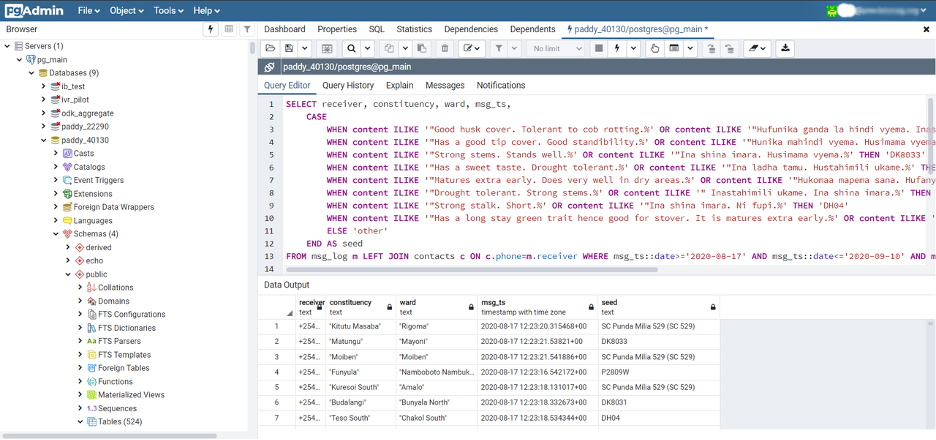
Keeping things secure on PG Admin
Yifan Powers, Global Senior Research Associate
For many farmers in Kenya, particularly in rural areas, local agro-dealers remain a key access point for inputs and agronomic advice on the optimal use of those inputs. This is especially important in the case of maize seed selection. Research has shown that while farmers are, understandably, risk-averse when it comes to adopting new seed varieties, interactions with agro-dealers can be a key factor in convincing them to switch.
However, agro-dealers often lack the knowledge and tools necessary to make optimal and informed maize seed recommendations to their customers. Instead, they often resort to past experience of customer demand in determining which seed varieties to stock and sell. This can lead to a vicious cycle in which farmers are not aware of which varieties are most suitable to plant, and – in response to poor demand – agro-dealers don’t market or stock these varieties as they don’t think that farmers will buy them.
To break this cycle, the PAD Kenya team has decided to experiment with an agro-dealer focused digital intervention to provide agro-dealers with information to learn about the most suitable maize seed varieties in their agro-ecological zone, as well as how best to reach their customers with that information. This project is ongoing and will continue throughout the rest of 2020 and into 2021.
Of course, there are many more members of the team that help to make sure that MoA-INFO best serves our farmers this season. For example, we have a team of enumerators who call MoA-INFO farmers to learn about their existing agricultural practices, collect feedback on the agricultural recommendations that we are developing, gather data on disruptions due to COVID-19, and much more. We also have staff who are developing new programs and partnerships that we hope to launch in coming seasons. Critically, we also have staff who keep the whole team going, particularly as we continue to adjust to working from home while our offices are closed.
Twende! Sisi wa timu ya MoA-INFO tunasema “Tuwasaidie wakulima wa Kenya kuwa na msimu mzuri sana!”
Read more about MoA-Info:

Stay Updated with Our Newsletter

Make an Impact Today



